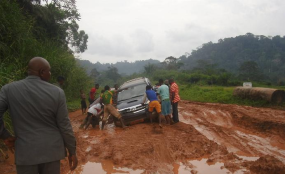n Cameroon, a volunteer youth group "Human Bulldozers" is shifting piles of mud to make roads passable. On one routes, they have cut the journey time from five to three hours.
They waited for years but no help came from the government. Enough was enough, they said, and came up with a solution. Hundreds of youths made their way to Nkondjock market square in Nkam Division of the littoral region of Cameroon.
Via loud speakers, they rallied their peers to join a movement for the repair of damaged roads. "We thought that before asking what the state has done for us, we should also show what we have done for the state," said Koumba Ernest, one of the team leaders.
Ernest and his colleagues organized themselves into working groups. They began work using rudimentary tools such as battered hoes, shovels and diggers to make some of the roads passable.
"The state has forgotten Nkondjock, not only Nkondjock but Nkam in general. It is now upon us, the population, to begin such community development initiatives," Ernest said.
Nkondjock residents soon saw the impact the group was making and gave them the nickname "Human Bulldozers." As the name suggests, the youths had bulldozed their ways along the only passable 80-kilometer stretch of road, dug drains, filled up potholes and leveled the heavily muddied road.
The road is a lifeline for Nkondjock residents who use it to transport goods to nearby villages. Transport vehicles used to take about five hours to make the journey assuming they didn't get stuck in mud. After the back-breaking effort by the youths, vehicles now require less than three hours for the trip.
"We are actually angry because despite the fact that we are in an agriculture basin that supplies food to western Cameroon and beyond, our roads are abandoned to deteriorate," said Kwemo Isaac, a notable resident of Nkondjock.
Cameroon has several food basins and Nkondjock is one of them. Nkondjock farmers supply maize and cash crops like coffee and cocoa to the rest of the country. But poor roads forced them to consider other ways of making a living.
"We have many buyers coming here for our goods. But because of bad roads, they push the buying price down to a level where we are being discouraged from working in our farms. This is because we hardly recover what we invest. We are working at a loss just because of the roads," Kwemo Isaac said.
Isaac added that the youths are helping but the government still needs to step in. "We have the farms but we are not able to give in our best. So we are on our knees before the government, before the state, saying that we have tried our best but this human bulldozer initiative alone is not enough."
The youths meet every Wednesday and Saturday to work. The men do the heavy liftings, while the women cook and run other errands. Even children are allowed to work. But 9-year old Prisca Berka said she didn't mind working.
"The other children and I fetch water for our parents who cook for those working on the roads," Berka said. "We also pass on drinking water to the workers when they are thirsty."
The administrative office of Nkondjock turned down DW's request for an interview, but an official said the government of Cameroon was aware of the road conditions.

